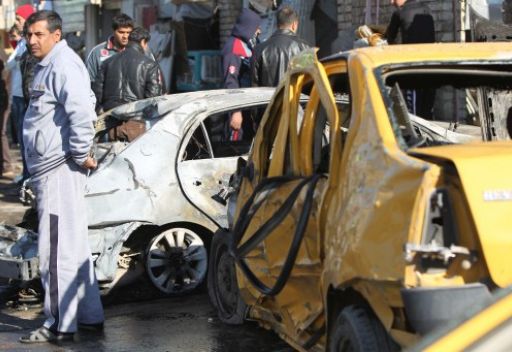A series of bombings across Baghdad on Tuesday were the deadliest in a spate of nationwide attacks that killed 32 people, as Iraq struggles with its worst violence since 2008.
A series of bombings across Baghdad on Tuesday were  the deadliest in a spate of nationwide attacks that killed 32 people, as Iraq struggles with its worst violence since 2008.
the deadliest in a spate of nationwide attacks that killed 32 people, as Iraq struggles with its worst violence since 2008.
At least seven car bombs and several roadside bombs struck the capital just before Iraqis broke their daytime Ramadan fast, the latest in brutal violence during the Muslim holy month that has left hundreds dead.
The blasts came barely two weeks after Al-Qaeda militants staged audacious raids on two prisons near Baghdad, freeing hundreds of inmates, including convicted jihadists.
In Baghdad, bombings hit a variety of targets including shops and a market, from around 5:30 pm (1430 GMT) onwards.
In all, 27 people were killed and 103 wounded, security and medical officials said.
In the central commercial district of Karrada, a car bomb killed five people and badly damaged store fronts and a nearby vehicle, reports mentioned.
Violence has risen sharply in recent months, with almost 1,000 people killed in July, according to official figures.
The attacks have mostly hit north of Baghdad, but the capital has not been spared.
More than 10 car bombs struck the Iraqi capital on July 29, killing at least 45 people, in a series of attacks claimed by Al-Qaeda front group the Islamic State of Iraq and the Levant.
Elsewhere in Iraq on Tuesday, five people were killed.
In Fallujah, west of the capital, gunmen armed with automatic weapons killed a policeman, while a bombing at a housing complex near Khanaqin, northeast of Baghdad, killed two people and wounded four.
Security forces also killed two militants driving explosives-laden vehicles in restive Diyala province, north of Baghdad.
The attacks came just weeks after brazen attacks on prisons in Abu Ghraib and Taji in which hundreds were freed.
Analysts, as well as worldwide police organization Interpol, had warned that the jailbreaks could lead to a rise in attacks as many of those broken out were linked to Al-Qaeda's front group in Iraq.
Illustrating the severity of the violence, UN figures indicate more than twice as many civilians were killed in Iraq during the first six months of 2013 as died in violence in Afghanistan during the same period.